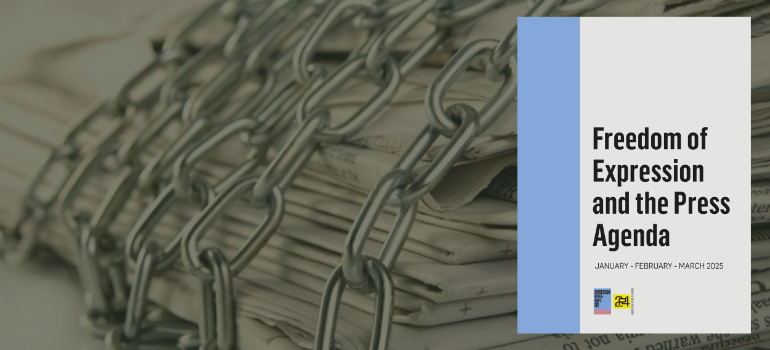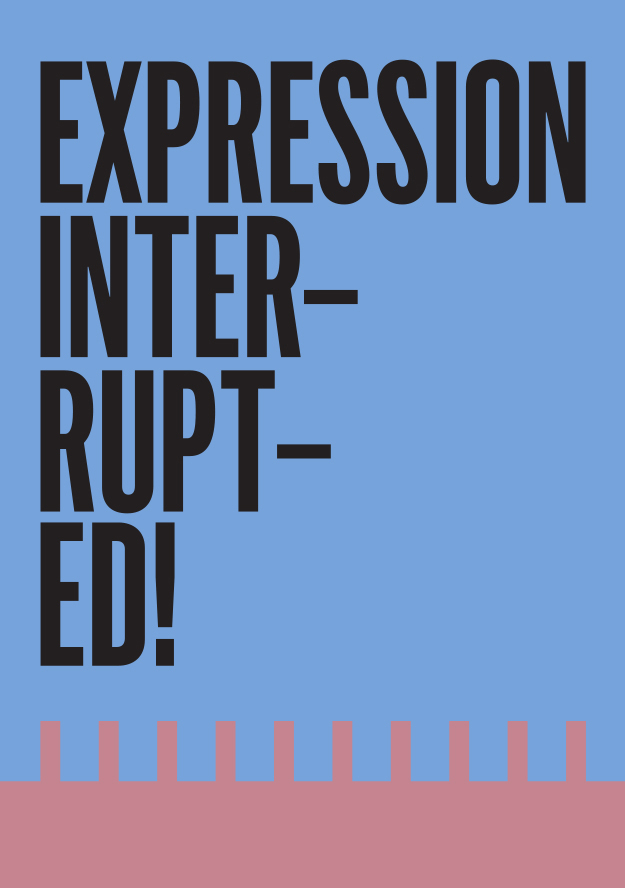Journalists and academics bear the brunt of the massive crackdown on freedom of expression in Turkey. Scores of them are currently subject to criminal investigations or behind bars. This website is dedicated to tracking the legal process against them.


According to the quarterly report published by Expression Interrupted, 157 journalists stood trial in 90 separate cases in the first quarter of 2025. A total of 25 journalists were imprisoned and 50 were arrested. RTÜK imposed over 25.3 million TL in fines on opposition television channels
The 13th issue of Expression Interrupted’s “Freedom of Expression and the Press Agenda” report has been published. The report, which is based on systematic court monitoring and open-source research, covers developments between January and March 2025.
The report finds that the first quarter of 2025 was marked by increased pressure on journalists in many areas, ranging from systematic prosecutions and obstructions while covering protests to online restrictions.
Click here to read the full report
According to the report, a total of 90 trials involving 157 journalists were held at the first instance courts during the first quarter of the year. Of these, 32 cases concluded: 19 ended in convictions, while 14 resulted in acquittals. In total, 28 journalists were sentenced to 41 years, 1 month, and 12 days in prison, along with judicial fines totaling 8,850 TL. In the same period, 25 new indictments were filed, and investigations were launched against 10 journalists.
Most common charge: “membership in a terrorist organization”
The most frequently used charges against journalists during this period were “membership in a terrorist organization” and “propaganda for a terrorist organization.” Journalists were prosecuted under Article 314/2 of the Turkish Criminal Code (TCK) in 27 separate cases, and under Article 7/2 of the Anti-Terror Law (TMK) in 21 others.
The third most frequent charge was “insulting a public official” (TCK 125), applied in 14 cases. Journalists were also charged in nine cases each with “insulting the president” (TCK 299) and “denigrating state institutions” (TCK 301). Article 217/A of the TCK, commonly referred to as the “disinformation law” (“publicly disseminating misleading information”), was used in seven cases.
Arrests and imprisonments for protest coverage
In the first quarter, protest zones became increasingly dangerous for journalists. Of the 50 journalists arrested during the reporting period, 22 were targeted specifically for covering protests related to the arrest of İstanbul Metropolitan Mayor Ekrem İmamoğlu and the government-appointed trustee to the Van Municipality. At least five incidents involving police violence, obstruction, or threats affecting 12 journalists raised concerns about press safety.
During this period, 25 journalists were imprisoned pending trial. Of the 21 journalists released in the same timeframe, 10 had been arrested earlier in the first quarter. Seven of the imprisoned journalists were arrested while covering protests against İmamoğlu’s arrest and imprisonment.
The number of imprisoned journalists, which stood at 33 at the beginning of the year, rose to 34 by the end of March.
Millions in RTÜK fines and 10-day broadcast ban
RTÜK imposed a total of 25,344,068 TL in administrative fines on Halk TV, NOW, SZC TV, and TELE 1 in the first quarter of 2025. More than 22 million TL of these penalties were linked to their broadcasts covering the arrest of İmamoğlu. SZC TV also received a 10-day broadcasting ban. Additionally, RTÜK issued a public warning accusing opposition broadcasters of “pushing the public into pessimism with negative coverage.”
In this period, RTÜK also extended its regulatory authority to YouTube. The Cumhuriyet newspaper’s YouTube channel, journalist Fatih Altaylı’s personal channel, and FluTV were all required to apply for broadcasting licenses.
A new threat: Cybersecurity Law
The Cybersecurity Law, published in the Official Gazette on March 19, drew heavy criticism from journalism organizations. Article 16, which stipulates prison sentences of two to five years for “falsely claiming a data breach,” was widely seen as a new censorship tool.
Article 8 of the law, which allows prosecutors to seize digital materials without prior court authorization in “urgent cases,” also sparked controversy for bypassing judicial oversight.
In the same period, the Constitutional Court once again annulled the provision on “committing a crime on behalf of a terrorist organization without being its member” (TCK 220/6), ruling that the revised version still failed to meet the principle of legality.
The court also found violations of the right to a fair trial and freedom of expression in at least two individual applications filed by journalists.
The European Court of Human Rights (ECtHR), on the other hand, once again placed Turkey at the top of its rights violation statistics for 2024. According to the data, of the more than 60,000 applications pending before the Court, 35.8 percent --around 21,600-- were filed from Turkey, placing it ahead of even Russia and war-torn Ukraine.
